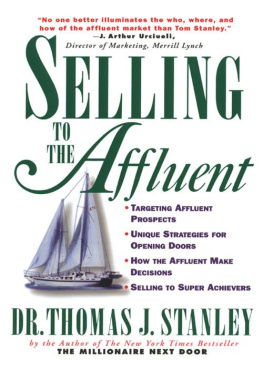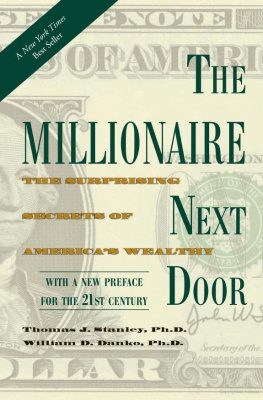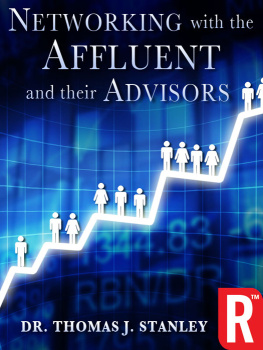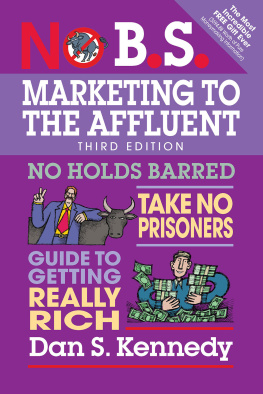Thomas J. Stanley - Selling to the Affluent
Here you can read online Thomas J. Stanley - Selling to the Affluent full text of the book (entire story) in english for free. Download pdf and epub, get meaning, cover and reviews about this ebook. year: 2012, publisher: Rosetta Books, genre: Business. Description of the work, (preface) as well as reviews are available. Best literature library LitArk.com created for fans of good reading and offers a wide selection of genres:
Romance novel
Science fiction
Adventure
Detective
Science
History
Home and family
Prose
Art
Politics
Computer
Non-fiction
Religion
Business
Children
Humor
Choose a favorite category and find really read worthwhile books. Enjoy immersion in the world of imagination, feel the emotions of the characters or learn something new for yourself, make an fascinating discovery.
- Book:Selling to the Affluent
- Author:
- Publisher:Rosetta Books
- Genre:
- Year:2012
- Rating:3 / 5
- Favourites:Add to favourites
- Your mark:
- 60
- 1
- 2
- 3
- 4
- 5
Selling to the Affluent: summary, description and annotation
We offer to read an annotation, description, summary or preface (depends on what the author of the book "Selling to the Affluent" wrote himself). If you haven't found the necessary information about the book — write in the comments, we will try to find it.
Selling to the Affluent — read online for free the complete book (whole text) full work
Below is the text of the book, divided by pages. System saving the place of the last page read, allows you to conveniently read the book "Selling to the Affluent" online for free, without having to search again every time where you left off. Put a bookmark, and you can go to the page where you finished reading at any time.
Font size:
Interval:
Bookmark:
Thomas J. Stanley, Ph.D.
Copyright
Selling to the Affluent
Copyright 1991 by Thomas J. Stanley, Ph. D.
Cover art to the electronic edition copyright 2012 by RosettaBooks, LLC.
All rights reserved. No part of this book may be used or reproduced in any form or by any electronic or mechanical means, including information storage and retrieval systems, without permission in writing from the publisher, except by a reviewer who may quote brief passages in a review.
Electronic edition published 2012 by RosettaBooks, LLC, New York.
ISBN Mobipocket edition: 9780795326004
For Janet, Sarah, and Brad
Why would anyone want to sell to the affluent? Many factors suggest that a career in this discipline can, in fact, be a rewarding one. The affluent population, whether measured in terms of a minimum annual household income of $100,000 or a net worth of $1 million or more, is far outpacing the growth of the household population. In recent years, both categories have grown at a rate of more than 20 percent per year. Interestingly, the number of households in America is increasing at a rate of less than 2 percent.
But growth is not the only factor which makes the concept of selling to the affluent so attractive. The affluent market in this country is a very resilient one. In the last 20 years, has there even been a single year when the number of high-income households declined? No. In each and every year since 1970, the number of households in the $100,000 or more annual income category has increased. The affluent population seems to have an uncanny ability to generate high incomes in spite of downturns in the broader economy. Most of the members of the affluent population are responsive to changes in the economy. Most are sellers in one way or another of a product or service. Most generate incomes from well-defined market niches or subsegments that are more insulated from the trends that significantly influence our general population. They are typically proactive in regard to capitalizing upon trends which may provide important opportunities in the market.
The cost of personal selling in the context of the typical individual target is often prohibitively expensive given modest revenue potential. However, affluent targets have greater promise. For example, households in America that have annual incomes of $1 million or more on average spend nearly $100,000 annually on interest on personal loans. Compare this form of behavior with the average households credit/consumption habits. The typical American household spends less than $1,000 per year for interest on personal loans. Yes, personal selling of credit services is better suited for the affluent. The same applies to expensive homes, luxury automobiles, and investment services. Remember that the wealthiest 5 percent of American families hold 58 percent of the wealth and nearly 20 percent of the income.
There is yet another compelling reason to consider a career in selling to the affluent. Only a minority of sales professionals who target the affluent have yet to acquire the skills necessary to do it effectively. Many of those professionals who are highly successful in this arena tell their stories in Selling to the Affluent. Almost all of these sales professionals earn more than $100,000 per year via the affluent market. Several contributors to this book make in excess of $1 million annually by addressing the needs of the affluent.
The genesis of this book comes from conversations, interviews, and the case studies of hundreds of sales professionals who target the affluent. Many of these marketers are truly extraordinary people. Their willingness to share strategic information is greatly appreciated.
I am indebted to my wife, Janet, for her guidance, patience, and assistance in the development of the manuscript.
Special thanks are accorded to Kay Campbell, Ruth Tiller, and Sharon Weaver for their help in editing and word processing. I owe a deep debt of gratitude to Susan Glinert for her sage editorial comments.
Finally, I wish to acknowledge the contribution of Sarah and Brad Stanley, who always gave their candid insights about the true value of countless concepts and case scenarios.
Thomas J. Stanley
PART 1
INTRODUCTION
PART 2
TARGETING THE AFFLUENT: SOME OVERLOOKED MARKETS
PART 3
INFLUENCING PEOPLE WHO INFLUENCE THE AFFLUENT
PART 4
SELLING TANGIBLES TO THE AFFLUENT
PART 5
CASE STUDIES: THE SELLING OF SERVICES TO THE AFFLUENT
Take a moment to visualize 100,000 sales professionals who target the affluent all seated in a large enclosed stadium. A picture of an affluent prospect appears on a huge overhead screen. A brief biographical sketch of the prospect is distributed to each of the sales professionals. The information includes the prospects occupation, social and professional affiliations, annual income ($183,350), net worth ($2.3 million), and achievements and/or awards. Also enclosed is an examination that contains only one essay question. The question asks the following: What does this affluent prospect need?
The majority of the sales professionals, more than 90,000, respond in a very similar way.
Financial consultants indicate that the prospect needs their specific brand of financial advice and investment products.
Life insurance agents state that the fellow on the screen needs a seven-figure face value life insurance product and estate planning.
Real estate agents state that this target needs the home on the third fairway that they just listed two days ago.
Jewelry sales professionals write that the prospect needs the $11,000 master timepiece and the prospects wife desperately needs the diamond encrusted womans version.
Luxury car sales professionals unequivocally pronounce that Mr. Affluent needs our top-of-the-line two-door while his wife would likely need the four-door touring sedan.
Clothing sales professionals are certain that this prospect needs a complete wardrobe overhaul given the picture displayed on the screen. They stipulate that he desperately needs their special-fabric, hand-tailored, custom-fitted, executive series of suits.
Travel consultants feel that Mr. Affluent and his family need the 24-day world cruise at the super-class level which includes a helicopter tour of the Great Wall of China.
But a minority of the sales professionals, fewer than 1 in 10, submit a completely different essay. Interestingly, this minority group contains Americas most successful marketers. How do they sell to the affluent? How do they influence people who influence the affluent? How do they find prospects when they are most vulnerable to solicitations? What themes do they use to encourage prospects to say yes to solicitations? How do they time solicitations to enhance the probability of closing the sale? How can their selling skills be acquired by others who wish to target the affluent? These are only a few of the questions that are answered in this book. As an introduction to the topic, examine several of these prototypical responses. Mr. Smart earned over $400,000 in net commissions last year by selling to the affluent. His exam reads as follows:
William Manchester, the author of the best-selling biography of Winston Churchill, once stated, Men who think of themselves as indispensable are almost always wrong. I fully realize that most affluent people can live and succeed in life without my basic product. There are thousands of people who sell identical or similar products. Thus, I always attempt to appeal to a higher need. Most of my clients and prospects in the affluent category are, in one way or another, selling something. They are business owners, attorneys, physicians, accountants, and sales and marketing professionals who happen to make extremely high incomes. More often than not, they buy from me because of something more than product and excellent service. I always attempt to help clients and prospects with that ever important need of increasing their revenue. I make referrals on behalf of all my clients who have something to sell. I also recognize their achievements both in conversations and in letters and cards that I send. Often, significant career achievements precipitate the need for my offerings. I pay special attention to determining the cash flow changes that are specific to the industries of which my clients and prospects are a part. Many of my clients receive up to two-thirds of their annual incomes during one or two months of the year. Calling upon them at other times shows gross insensitivity on the part of the sales professional. I am also actively involved in five trade/professional organizations that represent the segments of the affluent population that I have targeted. I specifically targeted the senior officers of several of these organizations. Some have purchased from me; others have not. But I have done many favors for all of them such as developing programs and seminars for their demanding members. I have also used my marketing expertise to further the causes of some of these organizations. I was instrumental in initiating a letter-writing campaign designed to influence selected lawmakers in opposing proposed legislation that would adversely affect the industry of which many of my clients are members. They have often reciprocated by asking me to give important speeches at major gatherings. Several have also published my ideas in their national trade publications. The affluent have a very strong need to affiliate with others within their same discipline. All things being equal, they prefer or need to patronize those sales professionals, as in my case, who are perceived as integral parts of these affiliation groups. I never take my clients for granted. Their careers, their revenue, and their achievements are significantly more important to them than whether or not they buy my product at all or purchase one from me or from someone else. However, I do my very best to associate my product and my form of service with these career-related needs.
Font size:
Interval:
Bookmark:
Similar books «Selling to the Affluent»
Look at similar books to Selling to the Affluent. We have selected literature similar in name and meaning in the hope of providing readers with more options to find new, interesting, not yet read works.
Discussion, reviews of the book Selling to the Affluent and just readers' own opinions. Leave your comments, write what you think about the work, its meaning or the main characters. Specify what exactly you liked and what you didn't like, and why you think so.












